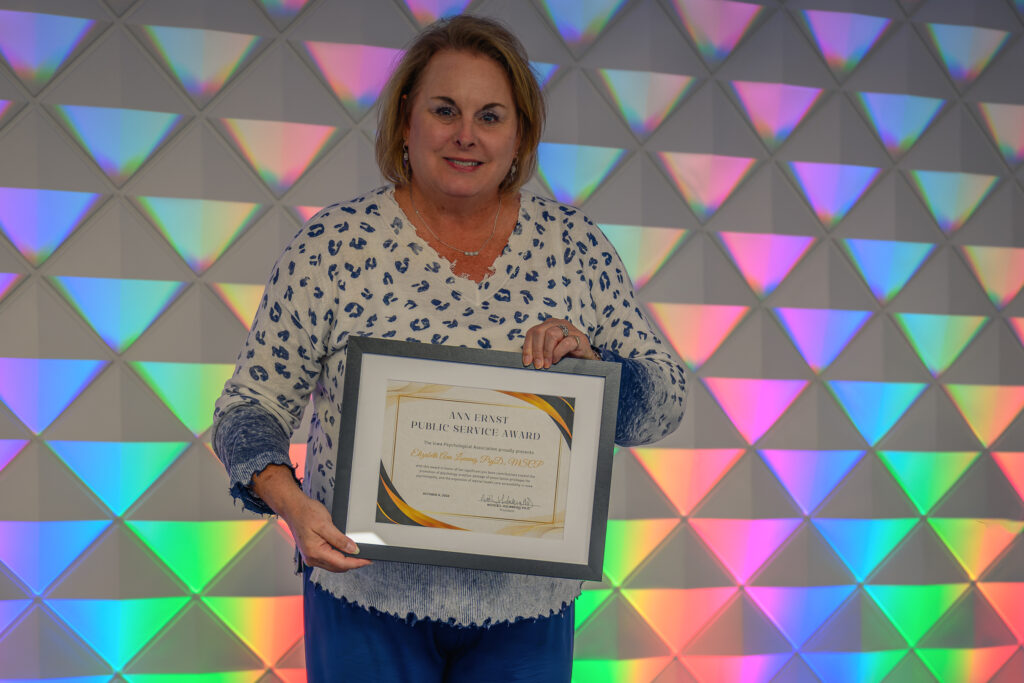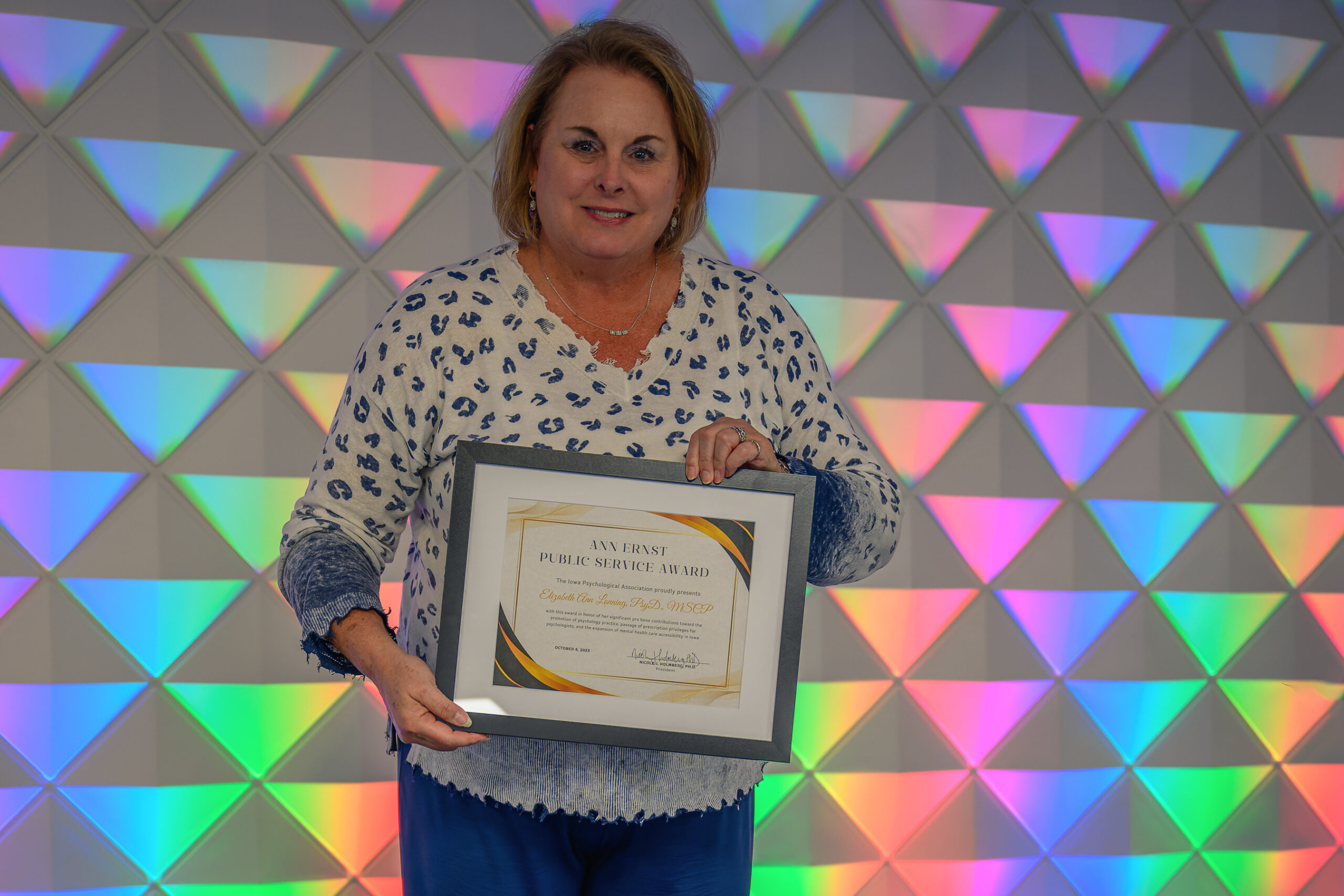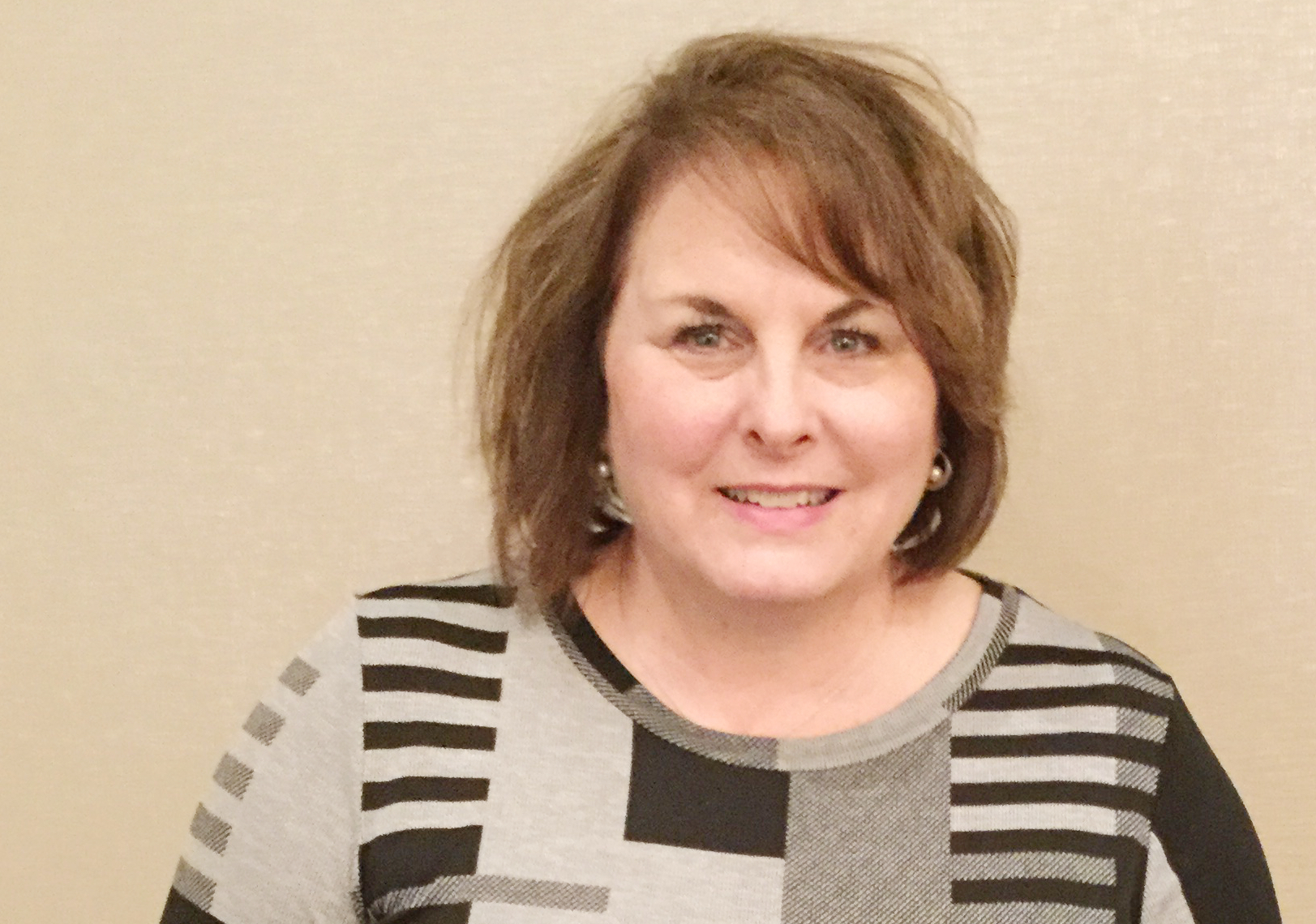2023 Ann Ernst Public Service Award
At the IPA Fall Conference on October 6, Dr. Bethe Lonning was presented with the Ann Ernst Public Service Award. This award honors a psychologist who has made, on a pro bono basis, significant contributions of a psychological nature that have benefited society as a whole. The contribution(s) may have been a single major contribution or reflect a consistent history of volunteer service to the community at large.

I want to thank Susan Barngrover for nominating me. She is unable to be here today as she is battling a serious illness and I wish her well. As I was thinking about what I could say today, I was thinking about the moving speech from Sally Oakes Edman this past spring and decided I couldn’t top that so I will simply say thank you to IPA for giving me the opportunity to serve this profession. Thank you all.
Dear Committee Members,
I am writing to nominated Elizabeth Lonning Psy.D. for the Ann Ernst Public Service Award for 2023.
Let me first give you some background about my association with Bethe. I am a practicing psychologist in Missouri wishing to return to my Iowa roots to gain my RxP supervision, but despite Bethe’s encouragement and mentorship over the last 5 years including going before the state board, I was unable to meet the criteria as a seasoned psychologist (more than 5 years since graduation). Bethe never gave up and it’s the spirit of helping Iowans improve their psychological care that has driven her vision.
She has been an outstanding advocate for Iowans over the last 20 plus years in the prescription movement. In 2002, when she attended the APA’s Practice Leadership Conference she began to model Iowa’s RxP legislation after that of New Mexico’s. She surveyed the membership twice (before the luxury of tools like survey monkey existed) to gauge their support. Despite the lack of enthusiasm, Bethe continued to sponsor RxP education at the annual IPA conferences to advance its utility and garnered grass roots support by her unflagging dedication and belief to the principles that psychologists can provide more comprehensive care to their patients through a broadened scope of practice.
Dr. Lonning has spent her career promoting the passage of RxP and helped draft the legislation from 2013 to 2016 when it finally passed. She then served on the joint administrative body of the BOM and BOP to establish rules for practice by 2019. Bethe, never leaves a job undone as proven recently when the governor signed into law the new legislation to broaden the definition of supervisor so that those trained could find an appropriate site as well doing away with the rule that you must graduate in the last 5 years to be eligible.
Dr Lonning has a long track record of public service to Iowans and the psychologists who serve them. Currently, she continues to serve Iowa’s psychologists as Director of Professional Affairs from 2021 to the present. She has held numerous appointments including Regional Chair for APA Public Education campaign 1997-1999, Membership Chair 1999-2004, Psychopharmacology Education Committee Chair 2004-present and a multitude of positions as a representative to APA including the executive council. She is active in APA on numerous appointments. She continues to advance Iowa psychology and has coordinated the alliance between NMSU and Iowa psychologists receiving their advanced training. In addition, she has worked diligently to begin the post doctoral psychopharmacology program at Drake.
In addition, she continues to run and oversee a busy practice in Davenport all while continuing to promote psychology by serving on numerous other public boards including those who represent Victims and underserved populations. She has received numerous awards from APA: Outstanding State Contribution Award 2017, Outstanding Psychologist of the Year 2016 and the Karl F. Heiser Advocacy Award 2016. Finally she received IPA’s Meritorious Achievement Award in 2006.
Speaking for the many people whose lives have been enhanced from their personal care and association with Dr. Bethe Lonning including psychologists, patients and Iowa communities, I heartily recommend her without reservation for the 2023 Ann Ernst award. In sum, Dr. Lonning has displayed her resolute commitment to the promotion of Psychology and the many people who have benefitted from her tireless care.

I want to thank Susan Barngrover for nominating me. She is unable to be here today as she is battling a serious illness and I wish her well. As I was thinking about what I could say today, I was thinking about the moving speech from Sally Oakes Edman this past spring and decided I couldn’t top that so I will simply say thank you to IPA for giving me the opportunity to serve this profession. Thank you all.
Congrats again to Dr. Lonning for her well-deserved recognition! Please continue to consider other worthy recipients of all of the IPA Awards.


 Iowa holds its place in psychology history as the fourth state to pass legislation that allows psychologists to prescribe medication after additional education and experiential training. The initial legislation was signed into law in 2016 and administrative rules were finalized in February 2019, which opened the door to begin licensing prescribing psychologists in Iowa.
Iowa holds its place in psychology history as the fourth state to pass legislation that allows psychologists to prescribe medication after additional education and experiential training. The initial legislation was signed into law in 2016 and administrative rules were finalized in February 2019, which opened the door to begin licensing prescribing psychologists in Iowa.






 The Membership Committee strives to increase member participation in activities that promote the IPA mission and Strategic Plan. A primary Membership Committee objective is to assist IPA’s standing committees in reaching their desired capacities. Over the past year, our Finance, Psychopharmacology, and Diversity and Social Justice committees have benefitted from the participation of some of the newest IPA members, including student members. This effort has been greatly appreciated. Meanwhile, the majority of IPA committees continue to seek members.
The Membership Committee strives to increase member participation in activities that promote the IPA mission and Strategic Plan. A primary Membership Committee objective is to assist IPA’s standing committees in reaching their desired capacities. Over the past year, our Finance, Psychopharmacology, and Diversity and Social Justice committees have benefitted from the participation of some of the newest IPA members, including student members. This effort has been greatly appreciated. Meanwhile, the majority of IPA committees continue to seek members.






 My road to becoming a prescribing psychologist really started many, many miles ago when I was in graduate school. Even way back then, in the early 1990s, I found a class on psychopharmacology taught by a local psychiatrist fascinating and the information was very useful in my early practice. Fast forward to the 2000s, when IPA first had members interested in pursuing advocacy for prescriptive authority. Through the years, I worked with Dr. Bethe Lonning and Dr. Greg Febbraro to advocate for the law granting us the right to prescribe medication with a limited formulary and additional training after our doctoral degrees. I completed the Farleigh Dickinson University Master of Science in Clinical Psychopharmacology (MSCP) program, graduating in 2011. I passed the Psychopharmacology Examination for Psychologists (PEP) in 2012. It would seem like that’s where my road would end, at a happy RxP place- but no! After helping to pass the legislation granting prescriptive authority for psychologists in Iowa in 2016, it took three years for us to negotiate rules to support the law with the Board of Medicine. The rules were not finalized until 2019, meaning that my 5-year window from the time of graduation to the time to apply for a conditional license was already passed.
My road to becoming a prescribing psychologist really started many, many miles ago when I was in graduate school. Even way back then, in the early 1990s, I found a class on psychopharmacology taught by a local psychiatrist fascinating and the information was very useful in my early practice. Fast forward to the 2000s, when IPA first had members interested in pursuing advocacy for prescriptive authority. Through the years, I worked with Dr. Bethe Lonning and Dr. Greg Febbraro to advocate for the law granting us the right to prescribe medication with a limited formulary and additional training after our doctoral degrees. I completed the Farleigh Dickinson University Master of Science in Clinical Psychopharmacology (MSCP) program, graduating in 2011. I passed the Psychopharmacology Examination for Psychologists (PEP) in 2012. It would seem like that’s where my road would end, at a happy RxP place- but no! After helping to pass the legislation granting prescriptive authority for psychologists in Iowa in 2016, it took three years for us to negotiate rules to support the law with the Board of Medicine. The rules were not finalized until 2019, meaning that my 5-year window from the time of graduation to the time to apply for a conditional license was already passed.